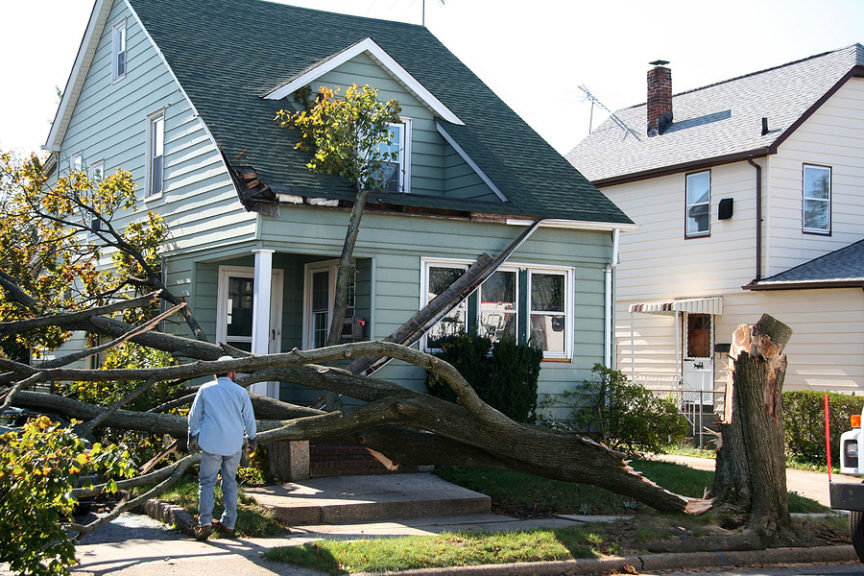Nashville has unfortunately seen its share of severe weather over the years, from the tornadoes of 1998 to the flood of 2010, and another devastating tornado just last spring. FiftyForward, being based in Davidson and Williamson counties, knows firsthand that Nashvillians have learned to stay strong in the face of adversity. We have learned it’s always good to be as prepared as possible in the event of an emergency. With the flooding in our community these past few weeks, and tornado season in full swing, here are some tips to help you and your loved ones stay safe during tornadoes and floods.
 According to the American Red Cross, there are over 1,200 tornadoes in the U.S. every year. They can happen at any time of day but are more likely to occur between 3- 9 p.m. The most useful tip, no matter where you live, is to know the warning systems already in place in your community. Tornado sirens, text alerts about severe weather on your phone, and local news outlets can all be useful in determining the severity of the incoming weather and when the warnings are in effect. The Red Cross also recommends identifying a safe place in your home to shelter from tornadoes. Ideally, this is a basement or at least a room on the lowest floor of your home with no windows. If you live on an upper floor of a building, a hallway in the center of the building is usually the safest place, as you may not have time to make it down to the basement. If you live in a mobile home, leave and try to get to a sturdy building as quickly as possible. Mobile homes are not safe in a tornado. If you are not at home, or you are in your car, get to the nearest safe shelter and stay there until the warning has passed. Avoid bridges and highway overpasses. Always bring your pets indoors, and, if you can, try and secure any items outside that could get picked up or blown away.
According to the American Red Cross, there are over 1,200 tornadoes in the U.S. every year. They can happen at any time of day but are more likely to occur between 3- 9 p.m. The most useful tip, no matter where you live, is to know the warning systems already in place in your community. Tornado sirens, text alerts about severe weather on your phone, and local news outlets can all be useful in determining the severity of the incoming weather and when the warnings are in effect. The Red Cross also recommends identifying a safe place in your home to shelter from tornadoes. Ideally, this is a basement or at least a room on the lowest floor of your home with no windows. If you live on an upper floor of a building, a hallway in the center of the building is usually the safest place, as you may not have time to make it down to the basement. If you live in a mobile home, leave and try to get to a sturdy building as quickly as possible. Mobile homes are not safe in a tornado. If you are not at home, or you are in your car, get to the nearest safe shelter and stay there until the warning has passed. Avoid bridges and highway overpasses. Always bring your pets indoors, and, if you can, try and secure any items outside that could get picked up or blown away.
After a tornado, the Red Cross recommends continuing to check your area’s warning systems to make sure it is safe to resume normal activities. If you are trapped, they recommend trying to send a text message, or finding something you can use to make noise with instead of shouting for help. If you are safe, it is still recommended to avoid broken power lines, and not to enter any damaged buildings until you have been told it’s safe to go back in. If you need to get in touch with someone, it may be more effective to text or use social media, since phone lines are often down or busy right after a storm.
For flooding, the CDC recommends gathering emergency supplies in advance: medications, important documents, and enough food and water for you and any pets for at least three days. Keep an eye on the local emergency weather alerts in your area, and if the order is given to evacuate, it is recommended to shut off all utilities at the source, and to switch off the main gas valve if your house uses gas.
After flooding has occurred, avoid driving through flooded areas or any standing water. It doesn’t take much water—only six inches—to lose control of a vehicle. Drink water that you know is clean and safe. If there is a water advisory, follow the guidelines in your area about boiling or treating it, and know what is and isn’t safe to drink, bathe in, or use for cooking. If in doubt, don’t use it. Do not return to your home until given permission that it is safe to do so.
If the worst happens and your home is damaged, or even if you just want to be a good neighbor and help others who may be in need, always make sure to follow safe clean-up guidelines. See this article for more information. In Nashville, you can also request assistance after a disaster here.
Knowledge is always power when it comes to emergency preparedness, so the more you learn about the potential dangers in your area, and how to navigate them safely, the better. Please check out the Red Cross and the CDC for more information.
By Elliot Burnette
Development and Marketing Assistant
FiftyForward


